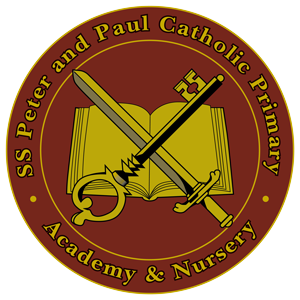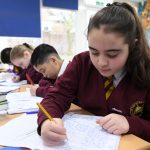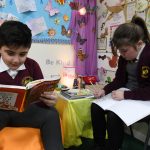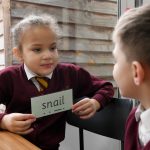Vision
At SS Peter and Paul, our vision is to foster an exciting and inclusive learning environment where every child, whatever their background or starting point, has a strong foundation in the English Language. We instil a love for reading and writing with the long term aim that our children ‘read like a writer’ and ‘write like a reader’ finding enjoyment in both essential skills for life. Both skills are intrinsically linked and are underpinned and supported through well planned listening and speaking opportunities. At SS Peter and Paul we focus on progression within oracy. We aim to foster a lifelong love for learning and effective communication through promoting the essential skills of reading, writing, listening and speaking.
Reading Intent
At SS Peter & Paul, children begin their reading journey with daily phonics lessons using the Read Write Inc synthetic phonics scheme and resources. Our pupils make a strong start to early reading, we prioritise this because it is essential to learning.
Reading is at the heart of our curriculum and we aim to provide our children with a rich and varied diet for reading. We want all of our children to love reading and build a strong habit for reading that will support them both in their academic learning and personal growth. We know that through reading, children develop their vocabulary, their knowledge of phonics and spellings, their fluency and comprehension, knowledge of writing techniques and, most of all, their imagination.
We believe that Reading for Pleasure is just as important as reading for learning. We understand that building strong habits for reading will enhance our children’s opportunities to not just access all parts of the curriculum, but also it will support them immensely on their journey beyond the school gates.
Reading Implementation
Through the rigorous delivery of an effective phonics programme, beginning at the very start of Reception, children learn to recall sounds and to read these sounds within real words and nonsense words. Alongside this work, children will build on their reading fluency, a skill which supports them as they move into whole class reading lessons. Through our reading lessons in year 2 onwards, the children work on a range of reading skills we call reading VIPERS. The reading VIPERS skills not only develop children’s reading fluency but also their understanding of the text they have read. VIPERS is an acronym for Vocabulary, Inference, Prediction, Explaining, Retrieval, Sequence/Summarise. Engaging, diverse class texts, alongside unseen comprehensions, are used as our vehicle to teach and develop these reading skills as children move through the school.
It is important to us that both the staff and children find these texts enjoyable, relevant and meaningful to read. Consequently, texts are regularly and collectively reviewed and then updated so that they continue to meet the needs and interests of the children.
We recognise the diverse learning needs of all our children and therefore, targeted support and interventions are provided to help every child succeed.
In addition to this, we have our own Reading Ambassadors: members of each class who have applied for the position to work with the English Lead to ensure that reading continues to be a top priority and enjoyed by all. Reading Ambassadors work alongside the English Lead to plan and hold various events throughout the school year to showcase our love of reading, for example World Book Day, Reading for Pleasure Day and poetry performances. The older members of the pupil leadership group take on extra responsibility as reading buddies to support the younger children in KS1 and read to them during lunchtimes.
Parents are invited into school to share books with their children, particularly in our Early Years setting. Each child has access to home reading books that are matched to their reading ability and which provide a suitable level of challenge. Children can choose books from their Reading for Pleasure area and from book boxes supplied by the Education Library Service. Children also have access to reading in the outdoors through the provision of ‘wheely wagons’ which are filled with books with a wide range of genres and from different backgrounds. Children access these in their free-time during break times and lunchtimes.
We strongly encourage parents to listen to their children read at home, and to log this reading using Boom Reader – an online reading diary. Older children are able to log on their home reading themselves. We also arrange local library visits for all year groups and children are encouraged to visit their library especially during their holidays.
Reading Impact
Our children love reading! They speak passionately about the class texts they are enjoying and this is evident through pupil voice and learning walks. Because Phonics is taught daily from the start of Reception, children are well prepared for the phonic screening test in Year 1. They make clear progress throughout the phonics scheme giving our early readers a foundation for becoming confident and fluent readers. Pupils move on to confidently discuss and compare texts. There is a strong community of enthusiastic readers who recommend what to read to others. A strength in Reading is not only evident in outcomes in the assessments, but also in more meaningful and increasingly independent engagement with the curriculum.
Writing Intent
At SS Peter and Paul, our intent is to foster confident, creative writers who can clearly articulate their thoughts, ideas and emotions and write coherently for a range of purposes. We aim to create a positive learning environment which creates a love for writing. We believe that reading and writing go hand in hand with one another. We also believe that if you can say it, you can write it. We want our children to be able to adapt their writing style to suit the audience and purpose of what they are writing. Confident writers will be able to manage levels of formality within their writing and will always consider the impact their writing will have upon the reader.
Writing Implementation
Our writing journey is taught across two or three weeks and is closely interwoven with the whole-class reading texts, allowing the reading to support the writing. Children’s writing skills are taught through an engaging and comprehensive curriculum.
Our English units are structured so that children from Years 1 to 6 develop their spelling, punctuation and grammar skills in the context of a high-quality text. The unit begins with immersing the children in the text. This is then followed by developing an understanding of purpose and audience through discussion and deconstructing of a model text. Speaking and listening opportunities are embedded throughout the English curriculum. Additionally, a day is dedicated to allow for some in-depth oral rehearsal based on the text to enhance children’s writing. This is a great opportunity to practice new vocabulary and sentence structures. It also helps children to engage further with the text and become more clearer about their ideas. Children are then equipped with the necessary grammatical skills and knowledge to enable them to be confident writers and to be able to write for purpose and meaning. This skill is modelled by the teacher. The children are given opportunities to explore this skill and apply it in the context of the text they are studying. These short-writing practice sessions give the children confidence before applying these skills in an extended piece of writing. In addition, children have opportunities for modelled, shared and/or guided writing, planning, writing extended pieces and redrafting their work. We have a real focus on editing and redrafting to ensure that children value this as part of the writing process.
We build in opportunities in our daily teaching for lots of collaboration between children and fluid ability groupings so that children can learn good writing models from high quality examples and from one another. Our working walls are updated regularly with the children and are used as a learning tool to assist with the writing process.
We have high expectations of handwriting, overall presentation and basic skills application with teachers using in-the-moment, live feedback to ensure that children’s fundamental errors are addressed and encourage children to show that they always take pride in their work. We use the Kinetic Letters Programme to support our handwriting teaching and this is taught throughout the whole school. Children are encouraged to use this handwriting throughout the day and across the curriculum.
Workshops are held throughout the year as an opportunity for parents and guardians to gain knowledge and more of an awareness of the curriculum and to build a positive relationship with their child’s English journey.
Staff are provided with professional development opportunities to support them with the effective teaching of English.
Writing Impact
Our children are confident and keen writers. Children know which tools they can use around the classroom to help them with their writing and so our children love to showcase their skills through their independent writing. Our children have pride in their work and love to show their writing off to their friends or to the adults in school. They know how to write for a range of different purposes and can do this across the curriculum. Our children’s work is neat and well-presented, therefore further demonstrating their pride in their work.
Documents
- Genre Map Year 1 2025-26.pdf pdf541.1 KbJan 21st, 2026
- Genre Map Year 2 2024-25.pdf pdf449.1 KbJan 21st, 2026
- Genre Map Year 3 2025-26.pdf pdf463.7 KbJan 21st, 2026
- Genre Map Year 4 2025-26.pdf pdf442.0 KbJan 21st, 2026
- Genre Map Year 5 2025-26.pdf pdf489.6 KbJan 21st, 2026
- Genre Map Year 6 2025-26.pdf pdf500.1 KbJan 21st, 2026
- Kinetic Letters presentation for parents.pdf pdf986.1 KbNov 4th, 2022
- Reading in Reception.pdf pdf1.1 MbSep 20th, 2023
- Reading-and-Phonics-Information.pdf pdf65.7 KbDec 8th, 2020
- Whole School Overview 2024-25.pdf pdf231.9 KbNov 25th, 2024




